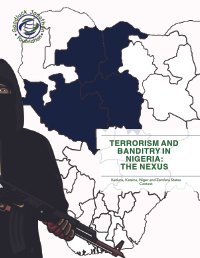By Oluwole Ojewale, et al.
This report details the findings of the research study that examined the plausibility between terrorism and banditry towards shedding new light on the dynamics of the country’s security challenges especially in northwest and north central Nigeria, within the focal context of Kaduna, Katsina, Niger and Zamfara States. Nigeria faces a plethora of security challenges ranging from the Boko Haram religious/violent extremism cum insurgency in the northeast to farmer-herder conflict and banditry in the northcentral and northeast, a revived secessionist movement in the southeast, police repression, piracy, and more recently attacks the nexus between banditry and terrorism; highlight the strategies and actions required by various stakeholders at various levels to counter the spread of banditry and terrorism in these focal states. Predominantly, the report utilises both qualitative and descriptive methods, generated from primary and secondary data gotten through desk review, and a consolidation of findings with feedback from consultations with stakeholders in selected focal states. The report undertook qualitative research in the focal states, documenting the experiences of some critical stakeholders through key on security installations, among others. In spite of government efforts, the security situation in Nigeria is deteriorating. The report thus explores the question of whether banditry and terrorism are the alternate side of the same coin and the security and policy implications of conflating both. The purpose of this report is to ascertain informant interviews. These interviews were cluster-based to provide a better context to the literature and systemically present the experiences of stakeholders. The report finds that while banditry gravely endangers public safety and security in the focal states, there are contextual differences in the origin, evolution, and manifestations of banditry in the focal states. Understanding these local variations is important to deploying effective and sustainable solutions to this spectre of banditry that defines governance in the states. The report also notes that there is no discernible ideological persuasion underpinning banditry beyond theft, extortion, and wanton violence. Bandits are primarily motivated by the alluring prospects of wealth in a region blighted by poverty and poor socioeconomic outcomes. However, this does not exclude the fact that fundamentalist Islamist groups operate in the same space as bandits. There is the possibility that some bandit groups might have adopted more of a religious modus operandi on their initiative or through limited contact with extremist groups. While the report notes the dearth of studies investigating in detail the theoretical and functional nature of the relationship between banditry and terrorism in these four states, the preliminary evidence points to the existence of both environmental and operational convergence between bandits and Islamist fundamentalist groups in the focal states.
Africa: Goodluck Jonathan Foundation (GJF) 2021. 43p.



